STOP Writing Autofiction, It's ALWAYS Terrible
Autofiction is trash
“Write what you know” is such a flawed adage. For one, most people don’t know much. Secondly, the things people do know tend to not be all that interesting. (I had written this, but then I started reading the play The Pillowman [it's absolutely brilliant], and that play essentially says what I said in the first two sentences, so though I'd written my sentences before reading the play, the play was released in 2003, so Martin still made his mark on that sentiment first, and he's more talented than me, so whaddya gonna do?) "Write what you know" is great advice for the people who read Save the Cat. It’s also the reason so much of modern fiction is nothing more than thinly veiled autobiographies pretending to be a novel or "autofiction."
Just like sharing the details of a crazy dream you had with your friends, the events of your life are never as interesting as you think they are. Going to university, trying to find yourself, and being wary of the future might be universal to many, but is it interesting? Is that really the mark you, the writer, want to leave on the world? The page is yours; the budget is limitless, you have all the words at your disposal to express or convince and that's the best you can do? Oh, I get it; you wrote what you know, but to what end?
The worst book I’ve ever read in my life is A Terrible Country by Keith (Nepo brother) Gessen. The younger sibling of Masha, he was born in Moscow and came to the US as a child and went to Harvard or some shit. His novel is about a kid who was born in Moscow, came to the US as a child, went to Harvard or some shit, then goes back to Russia to take care of his stupid ass grandmother.
With every word in existence at his disposal to tell us a compelling story, what does he do? He talks a lot about how the character (I'm just going to call him Keith because that's who he is) goes to cafes to look for jobs online. It's as stimulating as it sounds. I understand Keith is trying to convey the irony that Keith, having gone to a prestigious university, should be a desirable commodity on the job market, but irony strikes to show he wasted his time and efforts on a useless liberal arts degree. You see? It’s relatable to millennials who don’t want to be challenged and only want to read books that remind them of themselves. Relatability!
Keith has an archnemesis in the book. I can't remember his name, so I'll just call him Leith. They're exactly the same person with the same academic background, except Leith is the successful version. Keith never really shows us why Leith is bad. We can only assume it's childish jealousy. Seeing as Keith isn't clever or capable enough to write fiction, it must be assumed Leith is a real person. I want to shake Leith's hand for emasculating Keith so much. If Keith had actual balls, he'd have just used his nemesis' real name. That would have been based.
I'm not being hyperbolic when I say nothing happens in this book. Keith complains about not having a job, looks for jobs, and complains about his nemesis. This book is also a prime example of why would-be writers are constantly told: "Show, don't tell." The entire book plays out like this: "Things were going well between my girlfriend and me…" "Looking for jobs online was difficult…" "I was enjoying my hockey matches…" We never actually see passages that establish the relationship is going well. You know, things like two characters going on dates, discovering shared passions, acting like a couple. We are just told it went well and are expected to accept it. That is the entire novel. I kept waiting for the moment robot monkeys would come out and kidnap his grandmother and take her through a time portal. If you don’t have talent as a writer, then utilize the next best thing— do something really fucking stupid. At least it would be memorable.
Now I know why Keith wrote this book. He wanted to show up his enemy Leith and rub it in his face that he was a published author and got laid while in Russia. Would your little book really have gotten published, though, if your older sister wasn't Masha Gessen?
There’s an author named Anthony Marra who started releasing fiction around the same time as Keith. He’s an American who studied in Russia as an exchange student and took a particular interest in Chechnya. Listen, I studied in Russia too. Every single American I met living there thought they were going to write the next great Russian/American novel. ALL of them. Every single one who described their book described A Terrible Country. Goofy but charming American fumbles his way around Russia and tries to get laid.
Marra easily could have done that. Instead, he wrote A Constellation of Vital Phenomena, a remarkable debut novel about the Chechen Wars. I highly recommend it. While not as good, his second book, a collection of short stories, The Tsar of Love and Techno, is still a worthwhile read. Know what both books have in common? Neither of them features any American self-insert characters. All of the characters are locals. It's almost as if Mr. Marra knows what fiction means.
I need to pick on Keith Gessen a bit more. He’s had a better life than me, he can handle it. His first novel is called All the Sad Young Literary Man (Jesus Christ). It's about some guys at university not really knowing the meaning of life or what to do with themselves because Keith used to be a guy at university not really knowing the meaning of life or what to do with himself, so he wrote about it.
A review on Goodreads summed it up better than I ever could, so I will simply share it here and give credit to the person who wrote it:
Oksana, Behave is a delightful and witty 60-page book about a young girl who emigrates to the US from Ukraine. The first-person narration is humorous, and little Oksana gets into some amusing shenanigans. The typical misunderstandings from a character exploring a new culture can be found and enjoyed here. Unfortunately, the book goes on for another 200 pages, and it sucks.
The book features multiple time jumps that all seem arbitrary, and key life events just happen in passing. This can be done well, but more often than not, it's cowardly and a lazy way to avoid writing about the parts of a story that are actually interesting, you know, the reason people pick up books in the first place. If Maria had written Harry Potter, everything at Hogwarts and the wizarding world would have been briefly mentioned in passing during some throwaway conversation, and the books would have focused only on Harry doing the dishes at the Dursleys (I should stop giving myself good ideas). With each time jump, Oksana becomes less compelling and more repellant. Imagine Lena Dunham, but somehow even less likable. The wisecracking kid is somewhat charming at first, but as she gets older, she becomes insufferable. She's as annoying as people who point out how annoying it is when people in high school see Pulp Fiction for the first time and quote the movie beyond the point it loses all meaning.
Based on how Maria/Oksana interacts with her friends and classmates, spending any amount of time with her would be absolutely insufferable. She doesn’t behave at all.
What exactly is the story being told here, and why? What does Oksana even want? At some point, she decides she wants to be a writer (because fucking, of course, she does). Authors! For the love of Christ, learn to write a protagonist who is anything other than a writer. Other professions exist! Imagine you were writing fiction and weren't limited by imagination. Or is that honestly the extent of your imagination? It's like when an actor decides to write and direct a show for themselves, and it's about a fucking actor struggling/looking for work. Nobody wants to read about a writer who doesn't know what to write about. If David Mamet (certifiably insane rightwing lunatic) can make Glengarry Glen Ross compelling, you can write a story in which the main character is anything other than a writer.
Similar to Keith's books, it just meanders. She questions her purpose and what she wants out of life and navigates various relationships. We've been here before and done all this a million times over. She adds nothing to the conversation.
Dear writers, I know some events in your life seemed monumental to you, but please do consider if it's really interesting enough to subject us to read about them.
Maria is a far better writer than Keith, and I wish her all the best in her future endeavors. This just isn't a good book. Additional points taken off for Maria/Oksana being from Ukraine but spelling Kyiv as Kiev and referring to Ukraine as "THE Ukraine". That's some bullshit. Come to think of it, my memory of this book is getting blurry because I haven't taken my brain medicine. I recall at some point Maria/Oksana referring to herself as Russian. Now, I don't know if this is for the sake of the average reader (who isn't intelligent and doesn't know the difference between a Ukrainian and a Russian) and if the author is merely trying to keep things "simple." The second option is Maria doesn't know the difference between a Ukrainian and a Russian. Option three is she is Russian ethnically but was born in Ukraine, and option four is I need my brain medicine.
Next is The Idiot by Elif Batuman. Get it, The Idiot? Because Dostoevsky wrote a book called The Idiot and he is one of the most revered authors in history, and Elif and her insert character Elif are into Russian lit shit and pretentious academics love showing how clever and well-read they are with their cheeky little references and dumb dumbs will see the title and connect it to Dostoevsky's book of the same name and connect some dots and trick themselves into thinking Elif's book carries some kind of weight to it.
The author, a narcissist who went to Harvard and taught English in Hungary, writes a fictional work about a narcissist who went to Harvard and taught English in Hungary. But she's complex, you see. She has complex people problems, not poor people problems like us garbage. She's an Ivy Leaguer who can't hold down a job, and really, her problems are self-inflicted, but her plight is real, whereas ours is merely financial, mental, and physical. SHE'S TRYING TO DISCOVER WHO SHE IS GODDAMMIT.
At a certain point, reading about privileged university students writing about their woe-is-me-I'm-trying-to-be-the-superfluous-man lives becomes exhausting.
The only thing Elif’s Idiot managed to do was make me apologize to Dostoevsky for being so harsh on his Idiot.
Somebody save me from these terrible books.
I recently read an amusing short story by Charlie Kaufman from a collection of Kafka-inspired short stories. Kaufman plays with autofiction in a clever and hilarious way. But comparing hacks to Kaufman isn’t particularly fair. The collection is called A Cage in Search of a Bird. Batuman somehow managed to bully her way into this collection. I can't say if the other stories are as good as Kaufman's, but I will say everyone should read Kaufman's Antkind because it's the funniest book I've ever read. Kaufman, rather than being lazy and using actual stories (no matter how humorous) from his own life to insert into his fiction, likely uses the intense feelings of humiliation from said stories as inspiration to come up with ingenious and schlocky scenarios to punish his protagonist with. He's a good author. Read him.





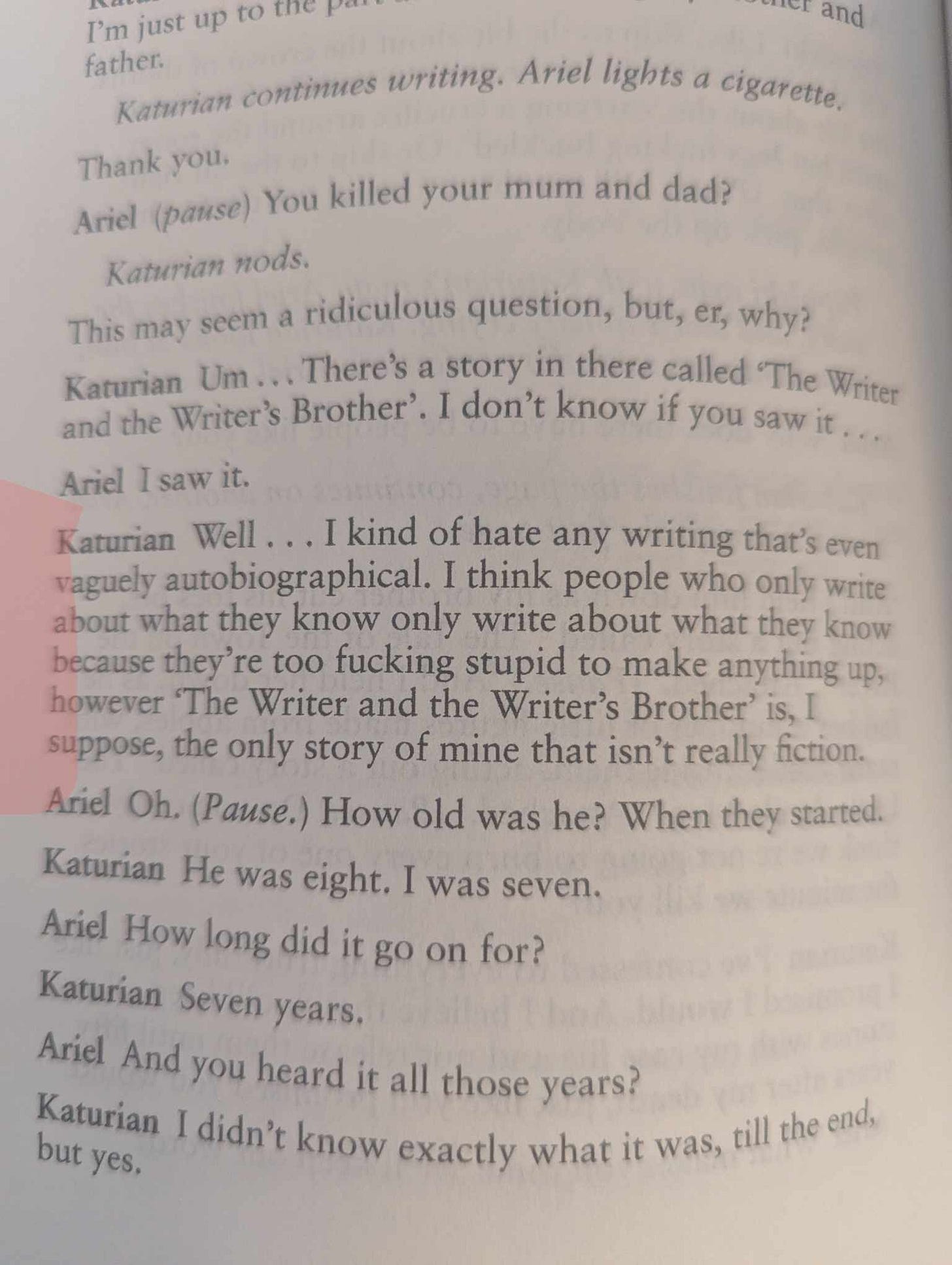
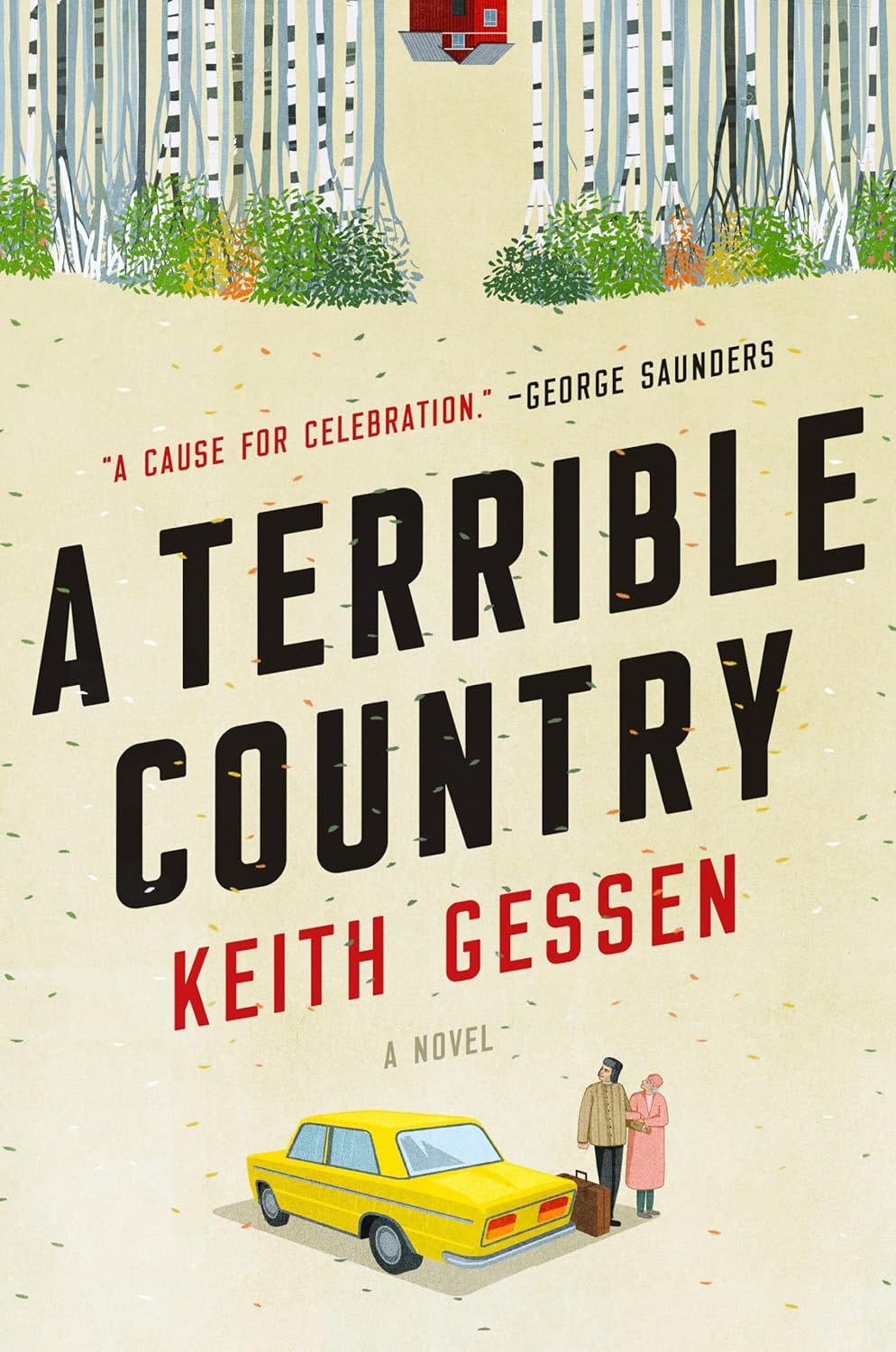
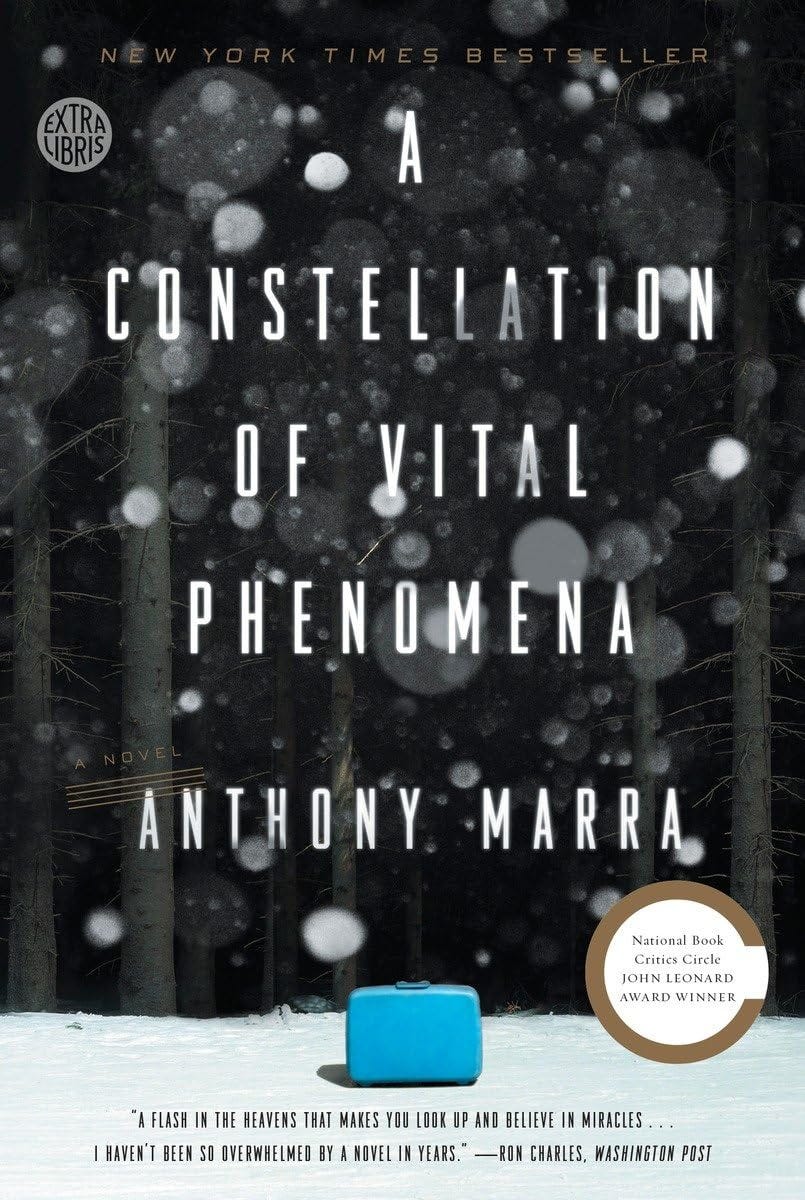
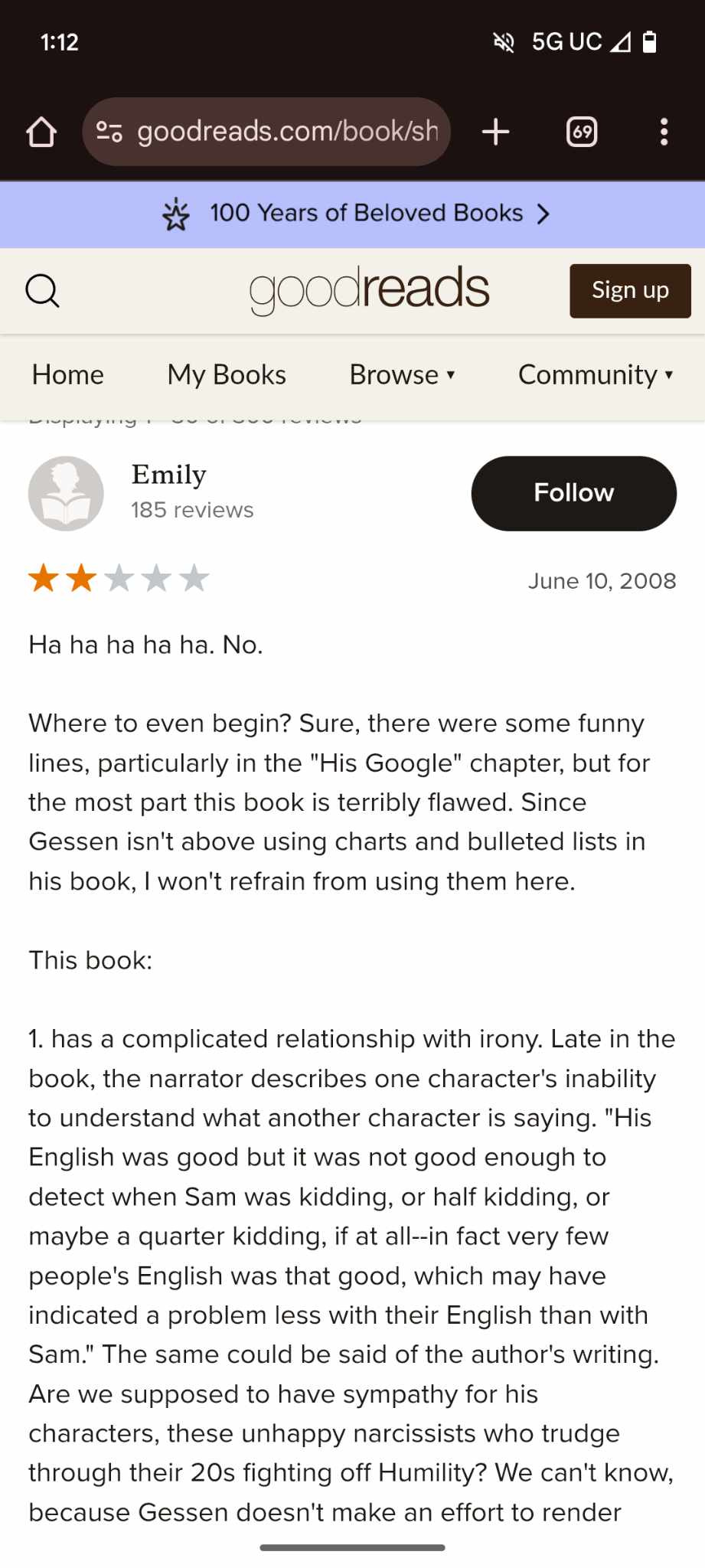
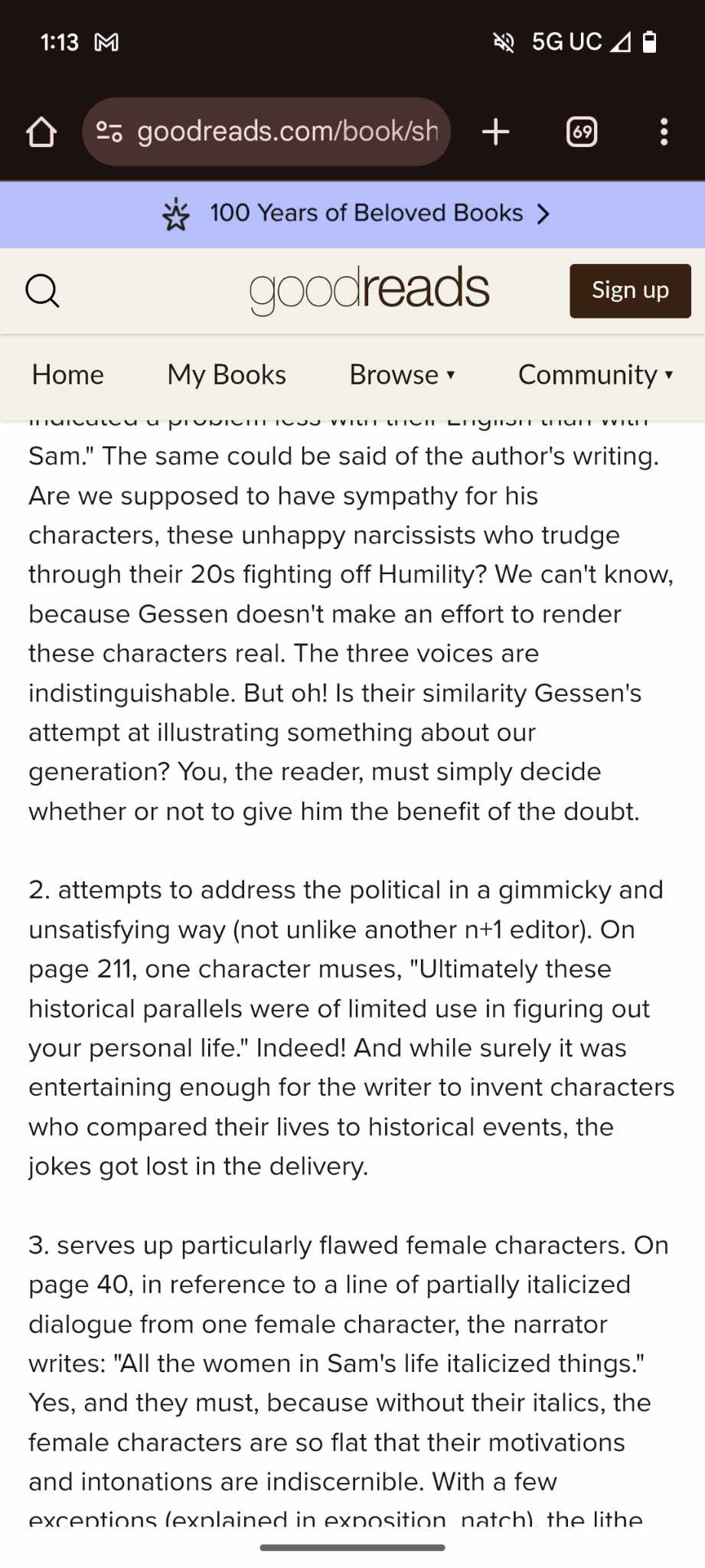
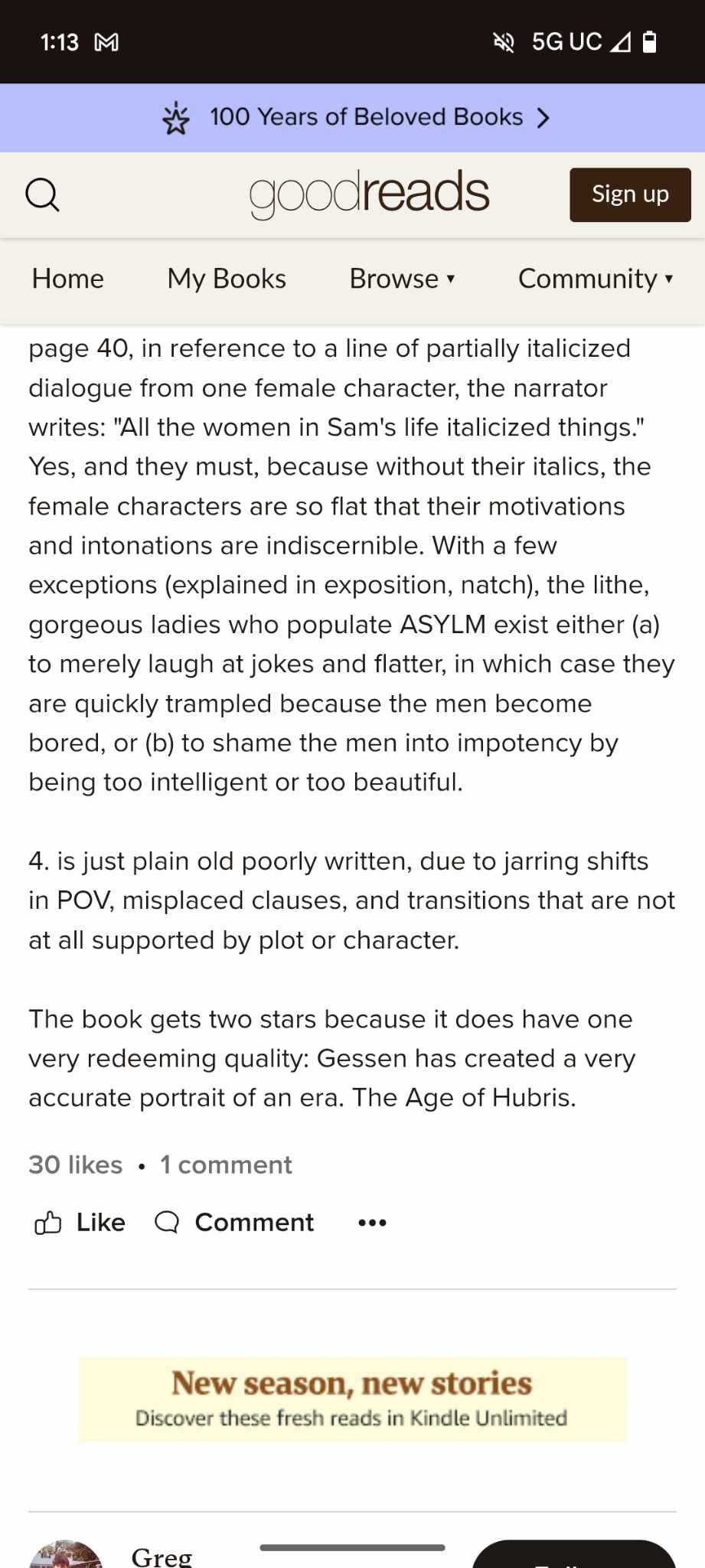
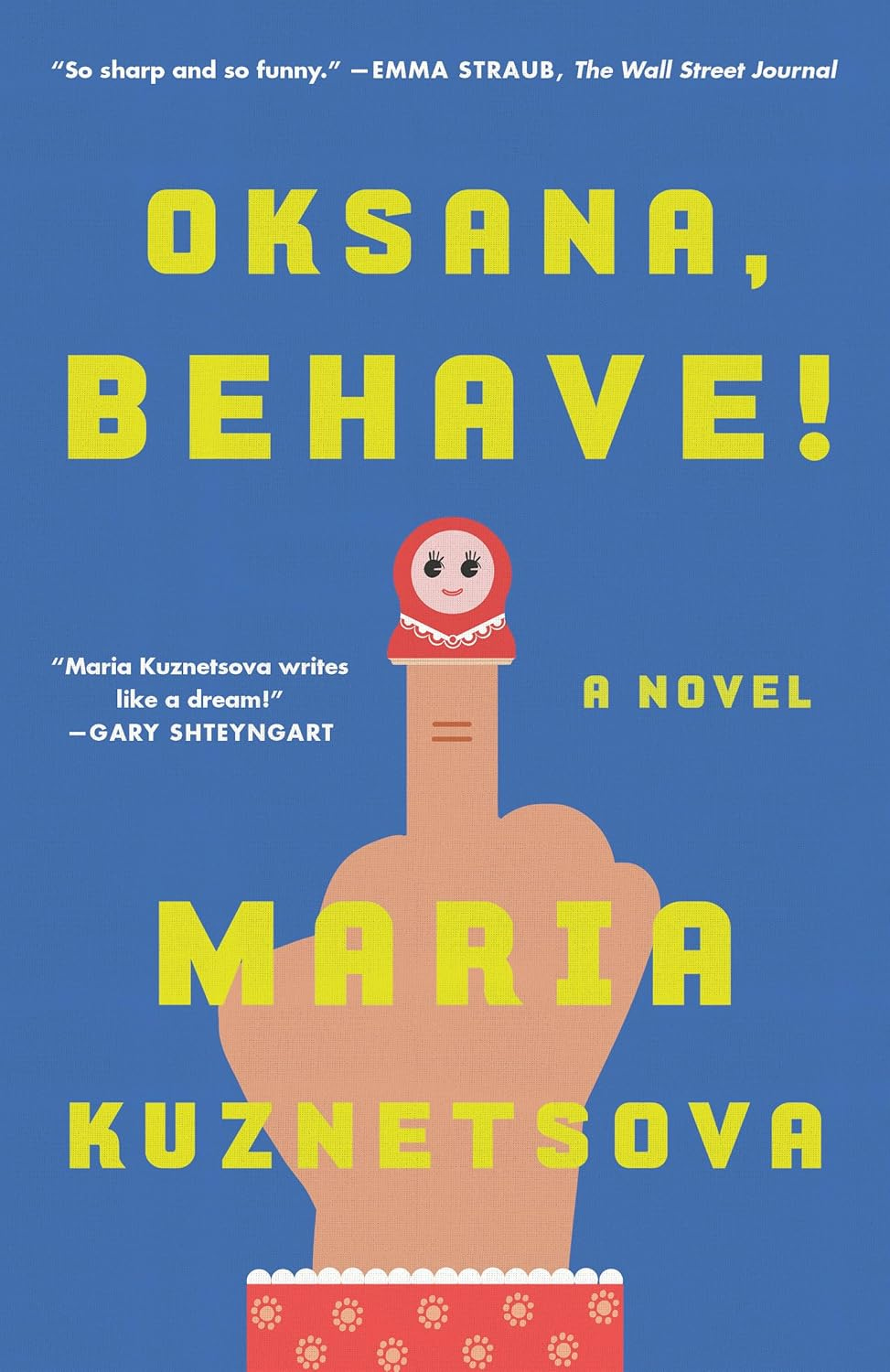
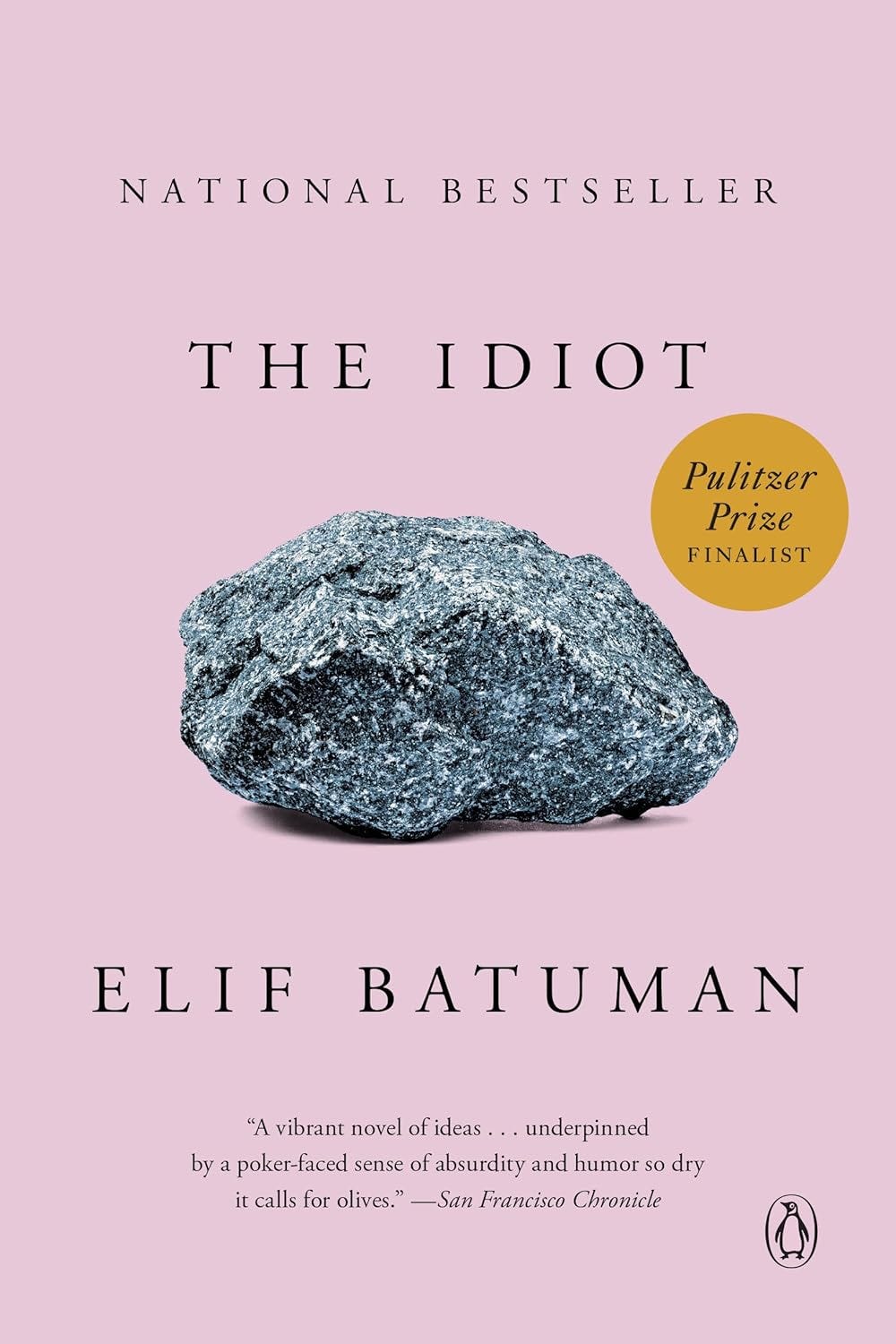
This is the new cult of homemade writers, endlessly dry-heaving diary entries, obsessively cataloguing each flicker of self-doubt like it's scripture, and taking their emotional temperature every thirty feckin seconds like it’s a fever dream of relevance.
I think the biggest problem with autofiction is that most writers only deal with surface-level events from their lives and superficial aspects of their personalities. I believe that all fiction is inherently autobiographical. Even when an author imitates preexisting work, that choice reveals something essential about them—an unoriginal voice still exposes itself by what it chooses to echo. The real magic happens when a writer distills the events and emotions of their life into character and plot. A good example of this is War and Peace. After publishing it, Tolstoy is widely believed to have suffered a breakdown. A careful reading reveals that the breakdown was already unfolding during the writing process, foreshadowed through characters like Prince Andrei Bolkonsky, Pierre, and many others.